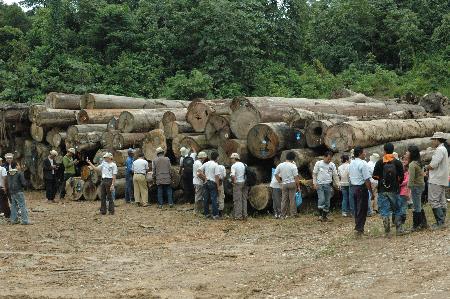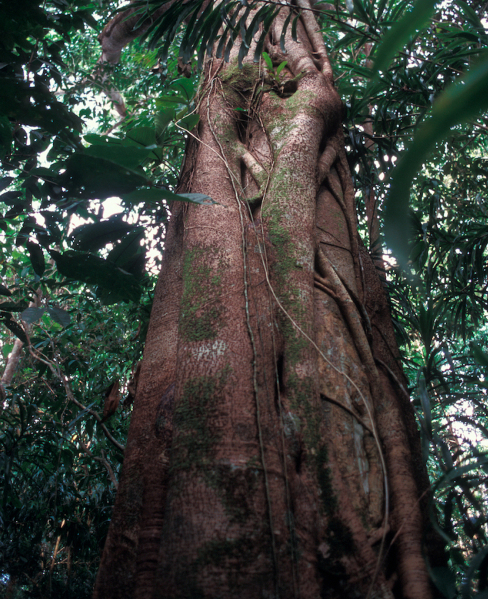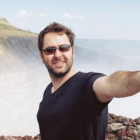The European Union’s Forest Law Enforcement, Governance and Trade (FLEGT) initiative calls on the involvement of civil society in the negotiation and implementation of their Voluntary Partnership Agreements (VPA) with timber exporting countries. But while getting a voice at the negotiating table is one thing, being able to contribute meaningfully during the full VPA process is another.
At the FLEGT Week 2013 meeting in Brussels, civil society representatives outlined some of the challenges that they have faced, and explained how they found solutions.
The new EU Timber Regulation came into force in March 2013, prohibiting illegal timber on the European market. Countries with FLEGT Voluntary Partnership Agreement status have developed a fully operational legality assurance system, which allows their timber to have access to the European market.
Currently, VPAs between the EU and six partner countries have been signed, while negotiations with nine other partner countries continue.
The VPA process is multi-stakeholder and, as a fundamental requirement, civil society is included. The negotiation of all six VPAs included social and environmental NGO’s, the timber industry and the partner governments. All participated in national structures set up by the VPA and relevant working groups, and decisions were taken mainly by stakeholder consensus.
At the FLEGT Week 2013 meeting, over 130 representatives gathered in Brussels to discuss current issues, and to share their experience of best practice.
|
Participants at the conference spoke to capacity4dev about the possibilities for civil society, and their experience. Watch their insightful interviews in the Public Group on FLEGT: Glen Asomaning, WWF’s West African Forests Programme Salai Cung Liang Thawng, Pyoe Pin Programme, Myanmar Abu Meridian, Indonesian Independent Forest Monitoring Group |
Supporting and strengthening civil society is a pertinent subject at present for Indonesia, which, after prolonged negotiations, signed their VPA in September. With experience of being part of the civil society organization, Telapak, during the negotiation, and now working with the Environmental Investigation Agency, Mardi Minangsari provided insights and advice to colleagues.
“It wasn’t easy,” she said of the process, “The biggest challenge that we had to overcome was not creating the space, but maintaining it.”
To build their relationship with government, Telapak provided research and ‘hard evidence’ of illegal logging practice, and proposed ground-up solutions. However, Minangsari admits that she had to ‘gate-crash’ the early consultative meetings, since her invitation wasn’t forthcoming.
“It’s important to bear in mind that the other stakeholders, particularly the private sector, will not like you. It is important to get their buy-in,“ she said.
Offering advice to civil society organisations (CSOs) that may be entering the VPA process, she said, ‘Knowledge is power. If you can present that knowledge in a way that doesn’t threaten, but supports the government, that is a very good way to start the relationship.”
Next, she sees persistence in pursuing open dialogue as key. It is important to ensure that goals are realistic, but can be built upon, she said, and to recognise that sometimes a compromised position is needed to move the process forward. ”But set boundaries so that your integrity will not be harmed,” she cautioned.
Now that the step from negotiation to implementation is underway in several countries, continued support to civil society is necessary.
“It’s about ensuring that civil society realise that they can participate in official processes, but they can also still initiate, suggest, propose ideas during implementation,” said Cath Long of the NGO, Well Grounded, who works to develop capacities and strategies in West African CSOs. “Certain organisations are doing this … they are coming back to government and holding them to account.”
This is taking place in Indonesia, where a CSO independently monitors the Timber Legality Assurance System (SVLK) certification, which was introduced by regulation in 2010. The Indonesian Independent Forest Monitoring Network, or JPIK, aims to help prevent illegal logging and now has more than 300 members.
“We support the members with capacity development and knowledge about the system,” said Abu Meridian of JPIK, “and we monitor SVLK activity on the ground.” JPIK also provides advice where there is conflict or land grabbing affecting a community, and they are a watchdog for corruption and money laundering.
In West Papua, JPIK prompted the investigation of a corrupt forest policeman, providing enough evidence to commence a court process. They demanded that the associates who received money from him were also sent to jail.
With this sort of action, JPIK intends to improve the SVLK system. Meridian’s wish-list towards this includes continued political will, maintained pressure from international stakeholders, and he also would like to see safety and security issues improved for the monitors.
In Ghana, the VPA is at implementation stage. There, the World Wide Fund for Nature’s West African Forests Programme provides guidance and training to a number of CSO coalitions for VPA involvement and general forestry discussion.
“There was a lot of momentum during the negotiation, and after, it calmed,” said Programme Manager, Glen Asomaning. To avoid such a lull between negotiation and implementation, he advised that implementation plans need to be set early on.
“One big underlying factor is the resources you need to push the process forward. My suggestion to start thinking about what financial, technical and infrastructure resources you will need get the process moving as soon as negotiation is ended,” he said.
At the other end of the scale, FLEGT VPA considerations are just commencing in the newly opened economy of Myanmar where, until recently, the space for civil society and media watchdogs was restricted.
“The government (now) wants recognition and legitimacy, and they want to be seen to be doing things in line with international practices … and show Myanmar citizens that they are really changing the country,” said Salai Cung Liang Thawng, the Strategic Advisor of the Pyoe Pin Programme, which supports the development of civil society.
Salai remarked that FLEGT has the potential to help the country’s reform agenda in not only in forestry sector but also in related sectors, such as customs, “since everything is moving". But while the current environment would appear to be more enabling for CSOs, Salai pointed out that laws permitting civil society involvement remain out-dated.
Civil society itself also needs to become organised, he added. “We need to do our homework as well, coming up with research, policy options and putting those on the table,” he said.
Since participation of civil society at policy level is a new experience for both CSOs and government, he maintained that the international community has an important role to play, proposing that the EU and international stakeholders ensure that all parties are clear on the consultative nature of FLEGT.
Photograph: Environmental Investigation Agency
This collaborative piece was drafted with input from David Sanmiguel, with support from the capacity4dev.eu Coordination Team.




Log in with your EU Login account to post or comment on the platform.